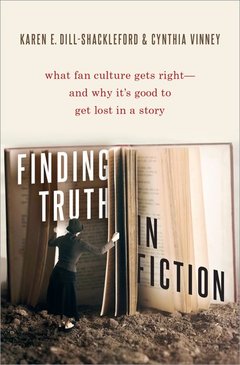Description
Finding Truth in Fiction
What Fan Culture Gets Right--and Why it's Good to Get Lost in a Story
Authors: Dill-Shackleford Karen E., Vinney Cynthia
Language: English
Subject for Finding Truth in Fiction:
26.37 €
In Print (Delivery period: 21 days).
Add to cart
Publication date: 04-2020
296 p. · 23.6x15.5 cm · Hardback
296 p. · 23.6x15.5 cm · Hardback
Description
/li>Biography
/li>
In Finding Truth in Fiction, two media psychologists reveal that there's much more to our desire to seek out stories in film, TV, and books than simple diversion - fiction can help us find truth in our real lives. Whether you consider yourself a fan of popular media or whether you find yourself thinking of a particular fictional scene for inspiration, you are not alone. Though some assume that interest in a fictional world is a sign of psychological trouble, the authors enthusiastically disagree. Because story worlds are simulations of our social world, we use them to make sense of our experiences and even decide what kind of people we want to be. This makes fiction far from trivial. By exploring our relationship with fictional stories and characters, the authors will examine how we create mental models in our minds so we can understand stories and characters and how we differentiate between the identities of characters and the actors who play them. What story arcs, such as the hero's journey, are we drawn to again and again? How do the moments that strike us as important in a story change as we age and move through different stages in our life? Delving into these questions and many more, the authors conclude that being a fan is not just healthy, it's human.
Karen E. Dill-Shackleford is a social psychologist who studies human relationships with fictional characters from film, television, and books. Her research explores the psychological processes that occur when we engage with fictional worlds and what we take away from those encounters. She has particular interests in the depiction of race and gender in popular culture fiction and in how meditation can help individuals cope with social issues. She is the author of How Fantasy Becomes Reality, co-author of Mad Men Unzipped, and editor of the Oxford Handbook of Media Psychology. Cynthia Vinney is a freelance writer and independent researcher who studies how audiences understand, engage with, and respond to popular media. She has published and presented on the ways audiences make meaning from narrative fiction, how stories help fans cope with personal struggles, and the impact of media use on identity development during adolescence. She is co-author of the book Mad Men Unzipped.
© 2024 LAVOISIER S.A.S.

